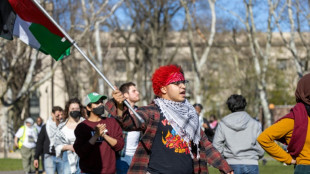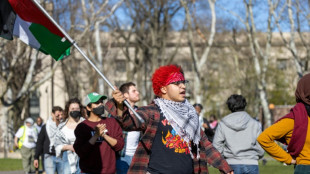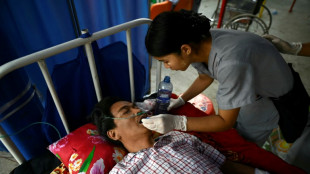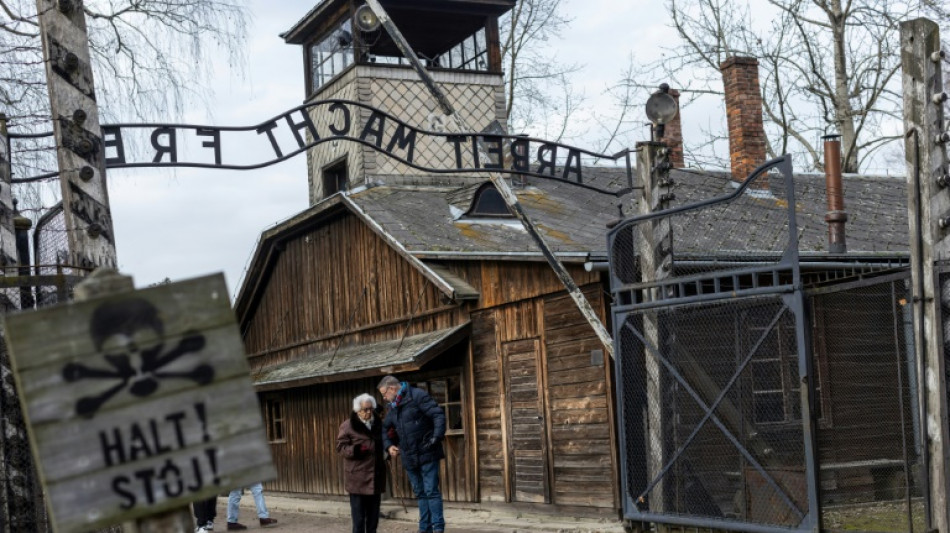
-
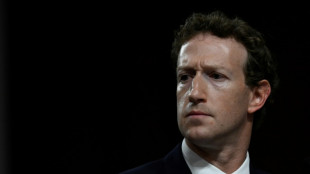 Zuckerberg denies Meta bought rivals to conquer them
Zuckerberg denies Meta bought rivals to conquer them
-
Starc stars as Delhi beat Rajasthan in Super Over

-
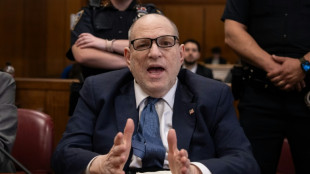 Weinstein asks to sleep in hospital, citing prison 'mistreatment'
Weinstein asks to sleep in hospital, citing prison 'mistreatment'
-
Amorim asks McIlroy to bring Masters magic to Man Utd

-
 Ruud keeps Barcelona Open defence on course
Ruud keeps Barcelona Open defence on course
-
Trump tariffs could put US Fed in a bind, Powell warns

-
 CONCACAF chief rejects 64-team World Cup plan for 2030
CONCACAF chief rejects 64-team World Cup plan for 2030
-
Putin praises Musk, compares him to Soviet space hero
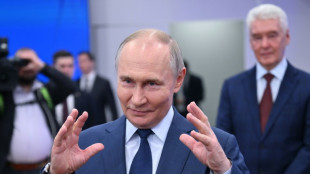
-
 Son to miss Spurs' Europa League trip to Frankfurt
Son to miss Spurs' Europa League trip to Frankfurt
-
US senator in El Salvador seeking release of wrongly deported migrant

-
 Trump tariffs could put the US Fed in a bind, Powell warns
Trump tariffs could put the US Fed in a bind, Powell warns
-
US judge says 'probable cause' to hold Trump admin in contempt

-
 India opposition slams graft charges against Gandhis
India opposition slams graft charges against Gandhis
-
Nate Bargatze to host Emmys: organizers

-
 US Fed Chair warns of 'tension' between employment, inflation goals
US Fed Chair warns of 'tension' between employment, inflation goals
-
Trump touts trade talks, China calls out tariff 'blackmail'

-
 US judge says 'probable cause' to hold govt in contempt over deportations
US judge says 'probable cause' to hold govt in contempt over deportations
-
US eliminates unit countering foreign disinformation

-
 Germany sees 'worrying' record dry spell in early 2025
Germany sees 'worrying' record dry spell in early 2025
-
Israel says 30 percent of Gaza turned into buffer zone

-
 TikTok tests letting users add informative 'Footnotes'
TikTok tests letting users add informative 'Footnotes'
-
Global uncertainty will 'certainly' hit growth: World Bank president

-
 EU lists seven 'safe' countries of origin, tightening asylum rules
EU lists seven 'safe' countries of origin, tightening asylum rules
-
Chelsea fans must 'trust' the process despite blip, says Maresca

-
 Rebel rival government in Sudan 'not the answer': UK
Rebel rival government in Sudan 'not the answer': UK
-
Prague zoo breeds near-extinct Brazilian mergansers

-
 Macron to meet Rubio, Witkoff amid transatlantic tensions
Macron to meet Rubio, Witkoff amid transatlantic tensions
-
WTO chief says 'very concerned' as tariffs cut into global trade

-
 Sports bodies have 'no excuses' on trans rules after court ruling: campaigners
Sports bodies have 'no excuses' on trans rules after court ruling: campaigners
-
Zverev joins Shelton in Munich ATP quarters

-
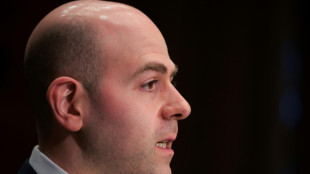 The Trump adviser who wants to rewrite the global financial system
The Trump adviser who wants to rewrite the global financial system
-
US senator travels to El Salvador over wrongly deported migrant

-
 UN watchdog chief says Iran 'not far' from nuclear bomb
UN watchdog chief says Iran 'not far' from nuclear bomb
-
Trump says 'joke' Harvard should be stripped of funds

-
 Macron vows punishment for French prison attackers
Macron vows punishment for French prison attackers
-
Canada central bank holds interest rate steady amid tariffs chaos

-
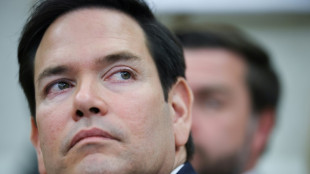 Rubio headed to Paris for Ukraine war talks
Rubio headed to Paris for Ukraine war talks
-
Australian PM vows not to bow to Trump on national interest

-
 New attacks target France prison guard cars, home
New attacks target France prison guard cars, home
-
Global trade uncertainty could have 'severe negative consequences': WTO chief

-
 Google facing £5 bn UK lawsuit over ad searches: firms
Google facing £5 bn UK lawsuit over ad searches: firms
-
Onana to return in goal for Man Utd against Lyon: Amorim

-
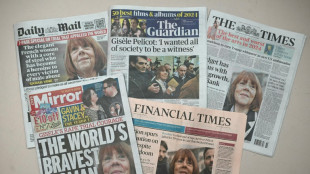 Tiktok bans user behind Gisele Pelicot 'starter kit' meme
Tiktok bans user behind Gisele Pelicot 'starter kit' meme
-
'Put it on': Dutch drive for bike helmets
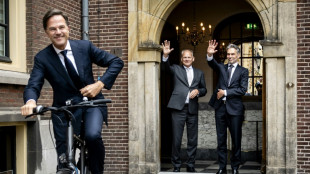
-
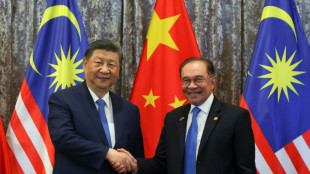 China's Xi meets Malaysian leaders, vows to 'safeguard' Asia allies
China's Xi meets Malaysian leaders, vows to 'safeguard' Asia allies
-
France urges release of jailed Russian journalists who covered Navalny

-
 Gabon striker Boupendza dies after 11th floor fall
Gabon striker Boupendza dies after 11th floor fall
-
UK top court rules definition of 'woman' based on sex at birth
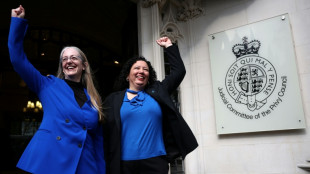
-
 PSG keep Champions League bid alive, despite old ghosts reappearing
PSG keep Champions League bid alive, despite old ghosts reappearing
-
Stocks retreat as US hits Nvidia chip export to China


Survivors strive to ensure young do not forget Auschwitz
On a frosty Polish winter evening, 96-year-old Esther Senot told the 100 or so shivering students at Auschwitz-Birkenau how she was a teenager much like them when she was first brought to the Nazi death camp on September 2, 1943.
Senot said her older sister, so frail and gaunt she was barely recognisable, made her vow to pass on the memory of the camp, a macabre monument to Nazi Germany's genocide of the Jews.
"She told me, 'I won't make it any further. You're young: promise me that if you make it out, that you'll tell this story so that we're not the forgotten ones of history'," Senot said.
Now nearly 97, Senot returned to the site of her captivity to fulfil her promise to her sister, handing down those memories of one of history's darkest chapters to the children on a school trip from France.
Between 1940 and 1945 the Nazis killed more than a million people at Auschwitz -- most of them Jews, but Poles, Roma and Soviet soldiers too -- during Germany's occupation of Poland.
"We'd been given figures in class but now we realised what people had gone through," said Charlotte, 16, discussing the trip a week later at her school in Versailles.
"Being born in 2008, I didn't think I'd have the experience of hearing a survivor," said her classmate Raphael, also 16.
But with the ranks of survivors dwindling with each passing year, Charlotte and Raphael may be part of one of the last generations with access to these firsthand accounts.
- 'Witness to witnesses' -
Auschwitz has become a byword for Nazi Germany's grim murder of six million European Jews in World War II.
Among its barbed wire-bordered barracks, the gas chambers and the crematorium ovens -- not to mention the mounds of hair shaved off those heading to their fates -- any suggestion of forgetting the Holocaust seemed fanciful to the teenagers.
"I was struck by the clothes, the suitcases... it brought a physical dimension to what I considered to be facts of history," said Raphael.
Yet 80 years after the Red Army liberated Auschwitz and its prisoners, and with those still alive now in the twilight of their lives, being forgotten by their generation is precisely what Senot's fellow survivors say they fear.
Haim Korsia, Chief Rabbi of France, which is home to Europe's largest Jewish community, has organised trips much like this one for more than two decades.
"That's the whole point of taking young people to Auschwitz today," the rabbi said. "They become witness to witnesses."
But soon the last of those original witnesses will be gone.
Henri Borlant, the only survivor of the 6,000 Jewish children from France deported to Auschwitz in 1942, died in December at the age of 97.
For the children of the 21st century, the Holocaust will "become history, like ancient times", worried Alexandre Borycki, president of a remembrance organisation based in Loiret, central France.
"We need to think about how we can continue to pass on all this history to younger generations who have a different way of engaging with it.
- 'Erasing all trace' -
Around 76,000 French Jews, including more than 11,000 children, were deported by the Nazis with the help of the collaborationist Vichy government.
Thousands of them, rounded up in Paris in July 1942, were interned at the nearby Pithiviers train station from where they were then deported to Auschwitz. Most never came back.
Hoping to get young people to engage with that tragic history, in 2021 Borycki launched an interactive project to bring it into the classrooms.
There, students play detective to find out as much as possible about those deported to Auschwitz via Pithiviers station given only a first name, surname and date of birth.
Borycki said their research into the archives allowed the association to fill in the gaps in the historical record.
But it also brought home the reality of the Nazi's so-called "Final Solution".
In some cases, "they find next to nothing. We tell them: 'you understand what the Nazis wanted to do, in erasing all trace of these people'", said Borycki.
- TikTok testimony -
For director Sophie Nahum, the best way to reach young people is by going where the young people are: social media.
Nahum collates testimonies from the last survivors of the Holocaust into short films of up to 10 minutes to be distributed online for her series "Les Derniers" ("The last ones").
With TikTok particularly popular among teenagers, Nahum has made the video-sharing app a cornerstone of her strategy.
"Young people read little or nothing in the press, and watch very little television. They don't watch long historical documentaries on the big channels," she said.
But with "a 10-minute episode or a two-minute extract on TikTok, they'll go there, look at several in a row and learn something".
"That's really where the youngest people are, and that's where you do the biggest business."
But she said she had no illusions over the limitations of the platform, accused of funnelling teenagers into echo chambers and failing to curtail illegal, violent or obscene content.
"It's clearly the most violent network, and it's very complicated to manage," she said -- all the more so given the Israel-Hamas war in Gaza.
That war, triggered by the Palestinian militant group's October 7, 2023 attack, sparked a rising tide of anti-Semitism across the world, not least on social media.
Much of that prejudice was already there but October 7 brought "virulent" hatred of Jews out into the open, Nahum said.
"Today, there are no longer any taboos, even with regards to the Holocaust: you can wish a survivor dead without any problem."
Back in the gloom of Auschwitz, Senot issued one last plea to Charlotte and Raphael's class before they left.
"If we, at our age, take the time to warn you, it's in the hope that it never happens again," she said.
S.Gantenbein--VB

